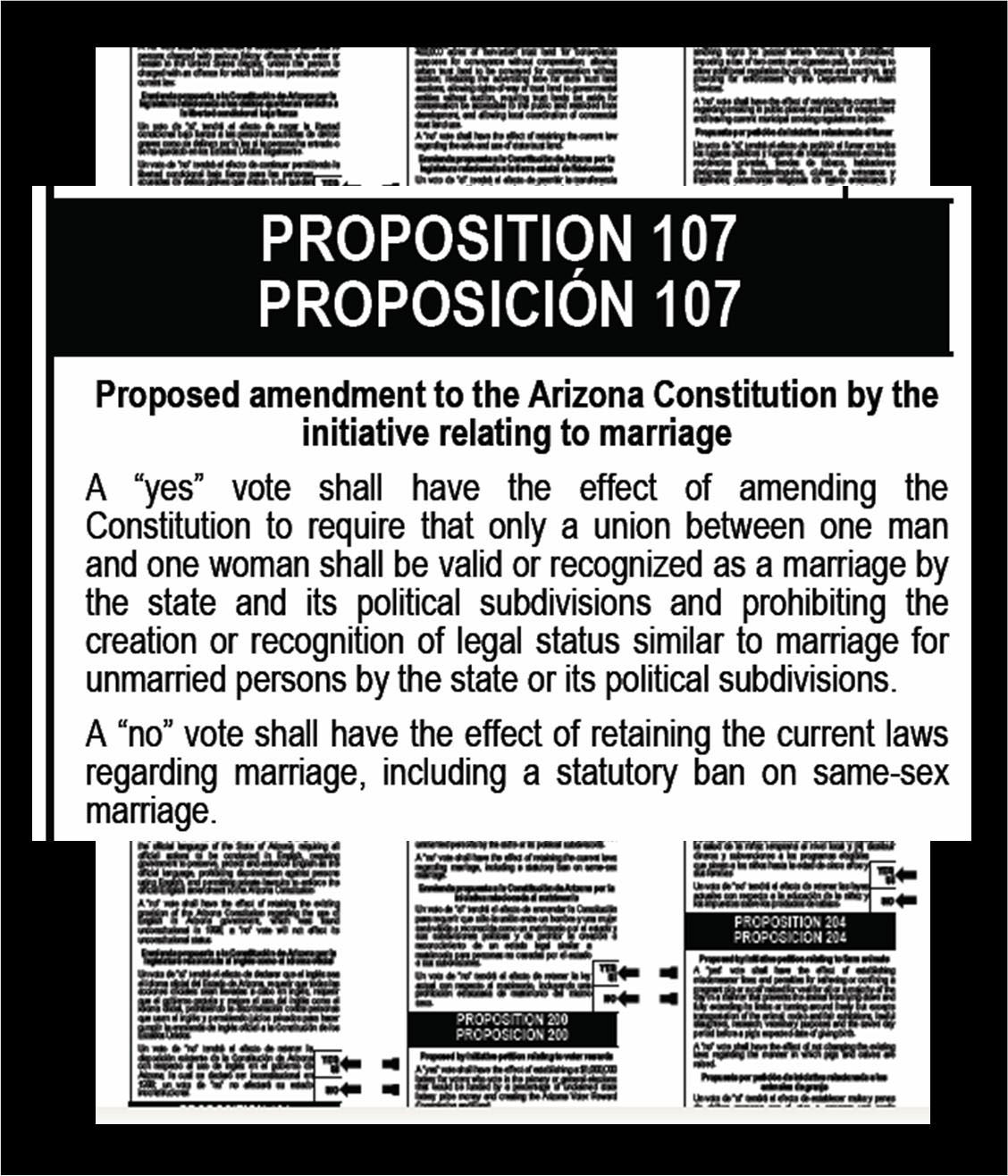
PHOENIX (BP)–The votes are still being counted, but a constitutional marriage amendment in Arizona apparently has become the first such proposal nationwide to fail at the ballot box.
Heading into Election Day, pro-family groups were 20-for-20 in adopting marriage amendments nationwide, passing them with an average of 71 percent of the vote. Seven additional states passed amendments Nov. 7, giving them majority status nationwide, with 27 now on the books.
But Arizona likely will become the exception. Proposition 107, as it is known, trails by approximately 32,000 votes, 51-49 percent, with about 341,000 ballots yet to be counted, according to the Arizona Daily Star. Although supporters still hope for a comeback victory, the large majority of outstanding ballots come from two counties — Maricopa and Pima — where the amendment lost, the newspaper said. Maricopa has around 250,000 uncounted ballots while Pima has 55,000 to 60,000, officials told the newspaper.
So, what happened in Arizona, and how did it likely become the first state to defeat a marriage amendment? Conservatives say several factors came into play:
— Confusing ballot language.
The language on the ballot said that a “no vote shall have the effect of retaining the current laws regarding marriage, including a statutory ban on same-sex marriage.” A person voting “no” could have thought he was voting against “gay marriage,” Lavy said.
“Even if Arizona ends up losing, I would attribute that to the poor wording on the ballot that was very confusing,” Glen Lavy, an attorney with the Arizona-based Alliance Defense Fund, told Baptist Press.
“… I was unaware of what the language was going to be on the ballot. When I looked at the ballot … I thought, ‘There are a lot of people who support marriage who are going to vote no.’ With that kind of language on the no vote, you’re going to get some confused voters.”
— The debate did not focus on “gay marriage.”
Arizona Together, the primary group opposing Proposition 107, was successful in switching the subject on the purpose behind the amendment. It ran a statewide television ad stating that “same-sex marriage is already illegal in Arizona” and that if Prop 107 passed, it would “take away domestic partner benefits.” The commercial’s narrator then went a step further and said:
“For seniors and domestic partnerships, it will limit Social Security incomes, and children of domestic partners will lose medical insurance…. Why take away domestic benefits, legal protection and healthcare? Vote no on Prop 107.”
The narration accompanied happy pictures of a young traditional couple, an elderly traditional couple and a little girl.
The focus on seniors had an impact, with 46 percent of those ages 60 and over voted against the amendment, according to exit polls. Contrast that to Virginia, where only 37 percent of those 60 and over voted against an amendment, and Wisconsin, where only 33 percent 60 and over opposed an amendment, according to exit polls.
“The issue of marriage was never mentioned by the opposition,” Lavy said. “They knew they could not win on that issue. They were putting senior citizens on [TV] who were living together saying, ‘We will lose benefits.’ They were putting unmarried couples who have domestic partner benefits on, saying, ‘Our children will lose health care protection.'”
Lavy, whose group supported the Arizona amendment, said there was no legal basis for the claims by opponents. The text in the amendment at the center of the controversy said that “no legal status for unmarried personal shall be created or recognized” by Arizona “or its political subdivisions that is similar to that of marriage.” The purpose, supporters said, was to prohibit civil Vermont-style civil unions and California-style domestic partnerships.
The Arizona Together ad was partially paid for by the Human Rights Campaign, the nation’s largest homosexual activist organization.
— A previous court ruling.
Unlike other states that voted on marriage amendments, an Arizona court recently ruled on “gay marriage.” In 2003, an appeals court panel voted 3-0 to uphold the state’s ban on “gay marriage,” and in 2004 the Arizona Supreme Court refused to hear an appeal.
Amendment supporters argued that the makeup of the courts eventually will change and that it’s best to cement the definition of marriage in the state constitution now. They also asserted that in the short-term, the courts could force Vermont-style civil unions on the state.
The fact that Wisconsin passed an amendment and Arizona apparently defeated one makes little sense, Lavy said. Arizona last voted for a Democrat for president in 1948. Wisconsin, meanwhile, last went Republican in 1984, and its amendment passed with 59 percent of the vote.
“You compare Arizona and Wisconsin,” Lavy said. “Arizona is not more liberal than Wisconsin…. There is no rational explanation of why it would not have passed in Arizona.”
Arizona’s amendment qualified for the ballot when supporters turned in more than 307,000 signatures, considerably more than the 184,000 required. If the amendment does in fact lose in the final tally, Lavy expects supporters to try again, possibly in 2008. The legislature also could take up the matter and put an amendment on the ballot.
Pre-election polls showed different results, depending on how the question was asked. An October poll by Northern Arizona University showed the amendment winning, 51-42 percent. That poll asked a question that focused more on the marriage issue. But an October poll by Arizona State University had the amendment receiving only 30 percent support. That poll question focused less on marriage and more on the barring of domestic partner benefits.
“When voters approach the ballot box thinking about the issue of marriage, marriage always wins,” Lavy said.
–30–
For more information about the national debate over “gay marriage,” visit http://www.bpnews.net/samesexmarriage

















